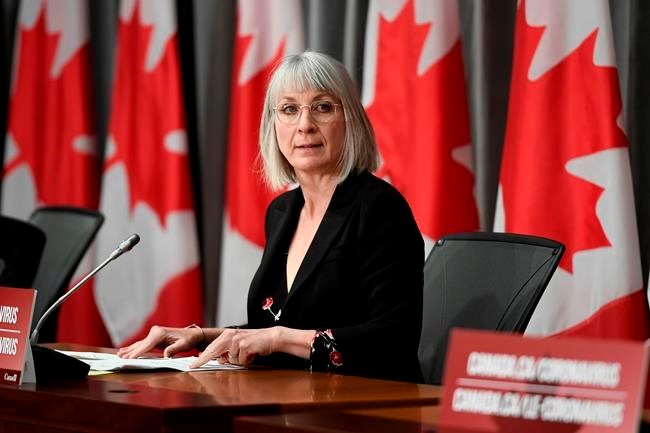OTTAWA — Indigenous Services Minister Patty Hajdu says the number of COVID-19 infections in First Nations communities has begun to decline, bringing hope that the worst of the Omicron wave has passed.
Hajdu says she understands why Indigenous leaders are worried that progress could be lost in regions where provincial governments are rapidly moving to lift public health orders.
"Indigenous leaders obviously are concerned," Hajdu said during a news conference Thursday.
Daily active case counts in Indigenous communities have declined 13.2 per cent from last week. Hajdu cautioned there is still need for vigilance as some communities deal with significant outbreaks.
"There are still areas of the country where cases are rising and in communities where the community spread risk remains a challenge," she said.
In Saskatchewan, the Federation of Sovereign Indigenous Nations and other tribal councils have called on the provincial government to reverse its plan to ease public health orders. They say the plan puts First Nations at a greater risk.
"Our northern communities have been some of the hardest hit in the province since the beginning of this pandemic," Meadow Lake Tribal Council Chief Richard Ben said in a news release.
"Ending or changing the public health measures without proper consultation from First Nations and their leadership is only going to create more outbreaks."
Saskatchewan announced earlier this week that it will scrap its COVID-19 vaccine passport policy on Monday and end nearly all orders, including indoor mask mandates, by the end of the month.
Maskwacis Health Services, which provides support to four First Nations in central Alberta, put out a notice Thursday that hospitalizations in the community are near the highest they've been in the pandemic. At the same time, vaccination rates are lagging, the notice said.
"Lifting restrictions at this time in Maskwacis, from a public health perspective, is not optimal," it said.
Proof-of-vaccination requirements and capacity limits at most venues ended in Alberta on Wednesday. Masks will no longer be mandatory in all settings for children under 12 and for all students in schools starting Monday.
Hajdu said it's a "tricky point in the pandemic." Governments and communities are grappling with how best to protect citizens, she said.
She said her department will support Indigenous communities.
An important part of that will be to continue to support vaccination efforts to get people a third dose, she said. As of Tuesday, more than 86 per cent of people 12 and older in First Nations communities had received a second dose of vaccine and 23 per cent had a booster shot.
Even with the high level of protection through vaccinations, First Nations health experts have been closely watching the spread of the Omicron variant.
The second and third waves of the pandemic led to higher rates of infection, hospitalizations and deaths among Indigenous people in many areas of the country.
Dr. Marcia Anderson, public health lead of pandemic response for Manitoba First Nations, said in a recent online video that First Nations people continue to be overrepresented in hospitalizations and intensive care stays.
But, due to the effectiveness of the vaccine, the percentage of people with COVID-19 who end up in hospital has been lower than during other waves, she said.
Dr. Tom Wong, chief medical officer of public health for Indigenous Services Canada, said vaccinations, masking, physical distancing and other measures, have kept the worst of the Omicron variant at bay on many reserves.
"With continued collective efforts, we are going to get through this Omicron wave together."
This report by The Canadian Press was first published Feb. 10, 2022.
— By Kelly Geraldine Malone in Winnipeg
The Canadian Press
Note to readers: This story clarifies the role of Dr. Tom Wong. An earlier version said he was Canada's chief medical officer of public health. He is in fact Indigenous Services Canada's chief medical officer of public health.




